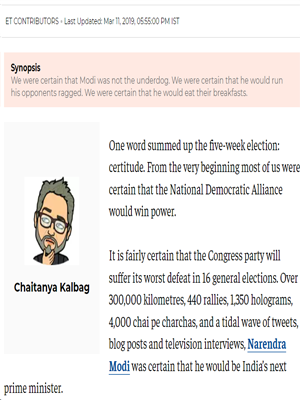Lok Sabha elections 2014: Narendra Modi may have to don new avatar to take along allies, new & old
[The Ecomonic Times]
Published date: 11th Mar 2019
One word summed up the five-week election: certitude. From the very beginning most of us were certain that the National Democratic Alliance would win power.
It is fairly certain that the Congress party will suffer its worst defeat in 16 general elections. Over 300,000 kilometres, 440 rallies, 1,350 holograms, 4,000 chai pe charchas, and a tidal wave of tweets, blog posts and television interviews, Narendra Modi was certain that he would be India’s next
We were certain that Modi was not the underdog. We were certain that he would run his opponents ragged. We were certain that he would eat their breakfasts. Tomorrow we will know what crumbs Modi has left on the table.
Television channels, which are enjoying a welcome boom in advertising and viewer numbers, have gone giddy slicing and dicing exit polls. This much is clear, and Raj Thackeray put his finger on it. People were voting for Modi, not for the BJP, not for the kamal. The BJP needed Modi to lift it beyond the maximum of 182 Lok Sabha seats it has ever won, in 1998 and 1999.
Back in 1971, Dr Philip Zimbardo conducted the now infamous Stanford Prison Experiment in Palo Alto. Twenty-four students were recruited; half acted as prison guards, and half as prisoners. The most important result was this: the students playing the guards became so abusive, and the students playing the prisoners became so submissive and suffered such emotional trauma that the experiment had to be shut down after only six days rather than the planned two weeks. In simple terms, power made good people do bad things.
I was reminded of this experiment when I watched some of our putative leaders on television this week. One of them, usually a well-spoken Bharatiya Janata Party official, shouted that he was sick and tired of the “pathological hatred” directed at his leader. The anchor was taken aback by the belligerence. This was just one example.
We have completed a remarkable exercise of democracy, and we must now make certain that democracy is not equal to majoritarianism.
Modi asked rhetorically during one interview: “Has my democracy submitted itself to one family?” and then was at pains to explain why he was opposed to Bangladeshi infiltrators but felt India’s shores should be open to Hindus from Africa, Fiji, Java, Sumatra (even Suriname). He cited a Supreme Court judgment of December 1995 that said Hinduism was a way of life.
Gopalkrishna Gandhi put it succinctly to me: “We have had both a culture of compliance out of what can be called fear, which is an extreme form of being in awe of somebody.
We have also had a culture of questioning, dissent and very independent thinking. Both cultures have existed simultaneously. At this juncture we are seeing freedom of expression trying very gamely to keep its head aloft.”
A Prime Minister Modi will bring more experience heading a state government than any predecessor in India’s history. He cut his organisational teeth with the Rashtriya Swayamsevak Sangh, and has run Gujarat for 13 years. But he has never had to share power.
He boasted to me some years ago that Gujarat had the smallest cabinet in the country. True, because Modi himself held the maximum number of portfolios, including the key one of Home, as well as General Administration, Administrative Reforms & Training, Industries, Climate Change, Ports, I&B, Narmada, Kalpsar, Science & Technology and all portfolios not allotted to other ministers. His 2012 cabinet had only seven ministers and nine ministers of state. He believes a lot in a strong bureaucracy, and his coming will likely straighten some of the kinks in the steel frame.
Manmohan Singh, who bemoaned coalition dharma, had 27 ministers, 11 ministers of state with independent charge, and 32 junior ministers. Modi has vowed that even a single-MP party will be valued. He will have to be a different kind of autocrat if he has to face down brinksmanship, bluff and blackmail in a coalition. Constitutional expert Subhash C.
Kashyap told me, “Sometimes you have to agree to withdraw criminal cases, sometimes you have to shell out money, sometimes you have to give ministerships, sometimes you have to allow ministers to go their own way and even ignore the prime minister, sometimes small groups have to be given creamy portfolios where they can make more money” just to stay in power.
Depending on Friday’s results, Modi may have to live with more than one of an array of hard-bitten regional leaders like Mayawati, Mulayam Singh Yadav, Nitish Kumar, Mamata Banerjee, Jayalalithaa, Chandrababu Naidu, KC Rao, Jagan Mohan Reddy and Naveen Patnaik. Two years ago I wrote that Manmohan Singh was the lone PM in a nation of presidents. If the BJP does not win enough seats, Modi will have to be a president of presidents.
Around the time the elections began I was watching House of Cards, a riveting American serial starring Kevin Spacey about one man’s ruthless and single- minded rise from a House majority whip to the presidency of the United States. It is peppered with oneliners and asides that would make a born-again Chanakya blush. I’ll leave you with one Frank Underwood soliloquy: “The road to power is paved with hypocrisy and casualties. Never regret.”






